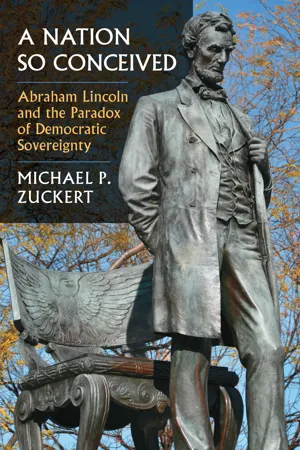
A Nation So Conceived
Abraham Lincoln and the Paradox of Democratic Sovereignty
- 416 pages
- English
- ePUB (mobile friendly)
- Available on iOS & Android
About this book
The culmination of years of work on Abraham Lincoln’s political thought, Michael Zuckert’s A Nation So Conceived argues for a coherent center to Lincoln’s political ideology, a core idea that unifies his thought and thus illuminates his deeds as a political actor. That core idea is captured in the term “democratic sovereignty.” Zuckert provides invaluable guidance to understanding both Lincoln and the politics of the United States between 1845 and Lincoln’s death in 1865 by focusing on roughly a dozen speeches that Lincoln made during his career. This reader-friendly chronological organization is motivated by Zuckert’s emphasis on Lincoln as a practical politician who was always fully aware of the political context of the moment within which he was speaking.
According to Lincoln’s speech at Gettysburg, America was new precisely because it was born in dedication to the first premise of the theory of democratic sovereignty: that all men are created equal. Lincoln’s thought consisted in an ever-deepening meditation on the grounds and implications of that proposition, both in its constructive and in its destructive potential. The goodness of the American regime is derived from that ground and the chief dangers to the regime emanate from the same soil.
Covering all significant speeches and writings of Lincoln both in his pre-presidential and presidential days, A Nation So Conceived is devoted to exploring the paradoxical duality of “created equal.” In a nearly comprehensive study of Lincoln’s thought, Zuckert uses lessons he learned from decades of teaching to reveal how Lincoln understood both its truth and its pathological consequences while offering an assessment of his aims and achievements as a statesman.
Tools to learn more effectively

Saving Books

Keyword Search

Annotating Text

Listen to it instead
Information
Table of contents
- Front Cover
- Half Title
- Title Page
- Copyright Page
- Dedication
- Table of Contents
- Foreword
- Acknowledgments
- Introduction
- 1. The “Perpetuation” Address: The Tragedy of America
- 2. The “Temperance” Address: Playing with Fire
- Transition: February 1842–December 1847
- 3. Mr. Lincoln Goes to Washington: Popular Sovereignty and the War with Mexico
- Transition: 1849–1851
- 4. A Giant with Feet of Clay
- Transition: August 1852–September 1854
- 5. “The Faith of Our Fathers”: Lincoln’s Case for the Declaration
- 6. Legality and Legitimacy in the Dred Scott Case
- 7. The Concept of Dred: Facing the Abyss of Dred Scott v. Sandford
- 8. Man the Miner, Man the Farmer
- 9. Dividing the House?
- 10. In the Shadow of the House Divided: The Lincoln-Douglas Debates of 1858
- Transition: From the Illinois Debates to the Harper’s Essay
- 11. In the Shadow of the Harper’s Essay: The Lincoln-Douglas Debates of 1859–1860
- Transition: February 1860–February 1861
- 12. Secession and Democratic Sovereignty
- 13. And the War Came
- 14. Lincoln’s Constitutionalism
- 15. De(a)dication
- 16. On the Second Inaugural Address
- Conclusion
- Notes
- Index
- Back Cover
Frequently asked questions
- Essential is ideal for learners and professionals who enjoy exploring a wide range of subjects. Access the Essential Library with 800,000+ trusted titles and best-sellers across business, personal growth, and the humanities. Includes unlimited reading time and Standard Read Aloud voice.
- Complete: Perfect for advanced learners and researchers needing full, unrestricted access. Unlock 1.4M+ books across hundreds of subjects, including academic and specialized titles. The Complete Plan also includes advanced features like Premium Read Aloud and Research Assistant.
Please note we cannot support devices running on iOS 13 and Android 7 or earlier. Learn more about using the app